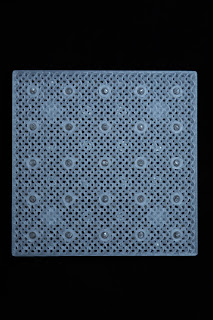Behind the scenes of ModuGlow
What is ModuGlow?
ModuGlow is modern, modular, organic lamp that can be anything between night lamp to art sculpture. It's built from 10x10cm panels containing 25 blinking bulbs. It can be stacked in 2 axis to provide arbitrary size lamp. Video showing 2x2 combination working.
Neon behavior
Neon bulbs exhibit S type dynamic negative resistance. If you understood last sentence feel free to skip this paragraph.
Negative dynamic resistance is a behavior of some electric circuits when with increasing current current decreases or the other way around with increasing voltage current decreases. In neon bulbs it manifests itself between strike and maintain voltage. When bulb strikes the voltage starts to drop due to series resistor. Dropping voltage makes bulb want to draw more power further lowering voltage until negative resistance region ends near maintain voltage. That way bulb "turns on" at higher, striking voltage while "maintains on" at lower maintaining voltage.
Image courtesy of wikipedia
This negative dynamic resistance opens a lot of possibilities for neon to work as active device in switching applications that will be covered later but first let's measure This strike and maintain voltage of few bulbs to see how they change over time. Measurements were conducted for 3 different models. Pure neon bulbs, green and blue fluorescent tubes.
| green | |
|---|---|
| strike | maintain |
| 79.6 | 64 |
| 85.9 | 69 |
| 81 | 62.1 |
| 86.8 | 69.1 |
| 85.7 | 73 |
| 97.6 | 70.7 |
| 81.6 | 69.6 |
| 88.1 | 66.5 |
| neon | |
| strike | maintain |
| 94.2 | 75.9 |
| 101.1 | 81.1 |
| 101.6 | 81.8 |
| 115.5 | 93.4 |
| 99.8 | 80 |
| 101.3 | 83.7 |
| 120.7 | 96.7 |
| 127 | 100.3 |
| blue | |
| 85.7 | 61.7 |
| 83.8 | 61.8 |
| 79.6 | 59.1 |
| 95.6 | 80 |
| 80.5 | 58.7 |
| 82 | 61.5 |
| 87.8 | 61 |
| 77.5 | 59.8 |
The switching circuit
The simplest possible oscillator is made from just capacitor, resistor and neon bulb (fig 1b). The capacitor slowly charges through resistor until it reaches strike voltage, at that point in time neon lights up and quickly discharges capacitor to maintain voltage. Blinking period can be controlled directly by varying capacitor value or indirectly by changing resistor or supply voltage. When big capacitor value is used quick discharge current may be so high it greatly reduces lifespan of bulb. In that case it's beneficial to add series resistor with capacitor to limit current.
Things get much more interesting when more than one one neon is involved and the interact with one another. Fig 1d shows simplest circuit in which two neons are lit up out of phase. When circuit is turned on one neon strikes first. It is then maintained by current flowing through it's resistor and the other resistor through coupling capacitor. The coupling capacitor slowly charges until the other bulb strikes, lowering voltage on itself from strike to maintain voltage. Through capacitive coupling it also lowers voltage on the other neon until it extinguishes.
 |
| Articles from 1960s about neon oscillator circuits |
Aging
Next question I asked myself is how this properties change over time. The internet hive mind couldn't decide if there's any pattern so I decided to age bulbs at high current, 2-3.5mA when rated max is 1.5mA for 3 days and measure their strike and maintain voltage again. The aging voltage varies so much because neon bulbs change properties a bit with temperature and also because I varied voltage to partially compensate that and partially to simulate different states of system.
I wasn't able to measure last 5 bulbs as my multimeter tipped over and crushed them. Nevertheless table shows that there's no clear pattern to changes observed. Notable observation is that strike to maintain voltage difference sometimes drops and sometimes rises but seems to always stay above 15V.
| green | |||
|---|---|---|---|
| strike | maintain | strike | maintain |
| 79.6 | 64 | 90.1 | 67 |
| 85.9 | 69 | 111.1 | 90.2 |
| 81 | 62.1 | 98.8 | 79 |
| 86.8 | 69.1 | ||
| 85.7 | 73 | ||
| 97.6 | 70.7 | ||
| 81.6 | 69.6 | ||
| 88.1 | 66.5 | ||
| neon | |||
| strike | maintain | strike | maintain |
| 94.2 | 75.9 | 91.5 | 72.7 |
| 101.1 | 81.1 | 90.6 | 72.2 |
| 101.6 | 81.8 | 89.4 | 69.9 |
| 115.5 | 93.4 | 99.5 | 78.1 |
| 99.8 | 80 | 90.7 | 72.6 |
| 101.3 | 83.7 | 87.6 | 69.3 |
| 120.7 | 96.7 | 104.9 | 83.2 |
| 127 | 100.3 | 84.3 | 64.5 |
| blue | |||
| 85.7 | 61.7 | 81.2 | 68.8 |
| 83.8 | 61.8 | 81.4 | 65 |
| 79.6 | 59.1 | 81.3 | 69.2 |
| 95.6 | 80 | 88.4 | 74.7 |
| 80.5 | 58.7 | 87.1 | 66.7 |
| 82 | 61.5 | 84.3 | 68.7 |
| 87.8 | 61 | 84.2 | 64.4 |
| 77.5 | 59.8 | 88.7 | 66.6 |





Comments
Post a Comment